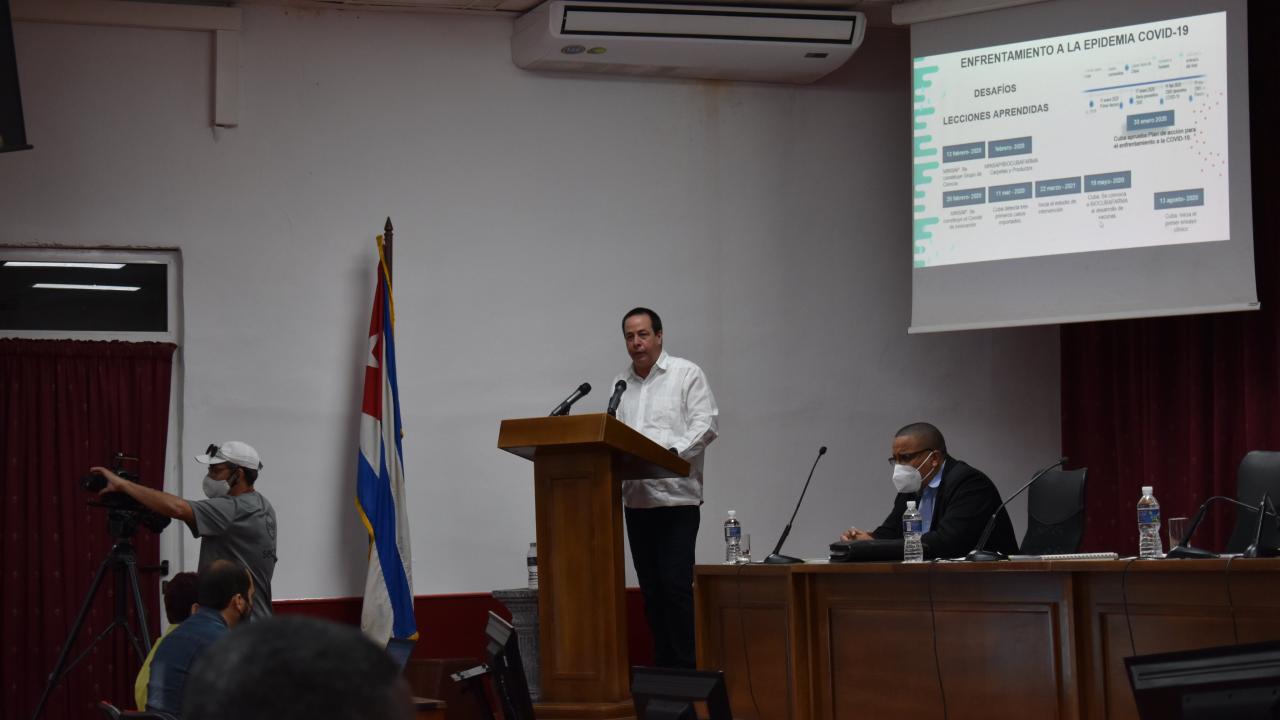The Cuban government described 2021 as "the worst" for the Public Health system in decades and admitted an increase in the number of deaths in all age groups and territories of the country, the general worsening of the population's health indicators, and deficient responses to medical emergencies.
This was stated in a report presented on Saturday by the Minister of Public Health, José Angel Portal Miranda, at a meeting in which other leaders of the country participated, reported the official website Cubadebate.
Portal Miranda acknowledged a "crisis caused by the coronavirus" which had a "significant impact on the availability of resources and on the population's health indicators." The minister also blamed the situation on the U.S. embargo.
"In general, during the past year, the number of deaths increased in all the country's territories, with the 60-and-older age group being the most affected. Likewise, Covid-19 had a negative impact on the infant and maternal mortality rates recorded," he said.
He also referred to "organizational problems, which have affected patient care and have had repercussions on the population’s satisfaction."
"We have had difficulties with the family medicine program, especially with the instability of resources, quality of care, the efficacy of clinics, and the functioning of the basic work groups," he said.
He admitted that "there are long response times to health emergencies, due to, among other causes, inadequacy in the operation of medical transport, and the low technical availability coefficient."
The most recent incident revealing Cuba’s deficient emergency services occurred in the municipality of Mella, Santiago de Cuba, and ended with the death of a six-year-old girl, who suffered convulsions for three hours while waiting for an ambulance, which arrived too late. The mother's protest, which caused a stir on social media, received a torpid response from the authorities.
According to the report, presented by Portal Miranda, "hospital management continued to show difficulties."
"Hospitals are unable to meet the demand for elective services, mainly due to the measures adopted to control the pandemic, the deficit of medical and organizational resources, and the non-compliance of some services, with gaps in the safety of patient care," he said.
Despite these human resources problems, the Cuban regime sent hundreds of Cuban doctors abroad to fight the pandemic away from home. At a time when the health system was falling apart, in provinces such as Matanzas, Pinar del Río, and other territories, the authorities had to resort to these same personnel, almost directly from work abroad.
Portal Miranda also cited a sustained increase in shortages and absences of medicines, medical supplies, diagnostic methods, and consumables as one of the elements that in 2021 had a direct impact on health services and meeting the population’s demands, despite continuous donations from allied governments and international organizations.
The Minister of Public Health also acknowledged the problems in the country’s technological infrastructure, obsolescence and equipment breakage.
When addressing risk factors that threaten better health indicators among the population, Raúl Pérez González, director of the National Institute of Hygiene, Epidemiology and Microbiology (INHEM), referred to data on people with toxic habits, among others.
The results of health surveys in the population over six years of age showed that 21.6% of the Cuban population smokes, the prevalence of this addiction among 15-19 year-olds is 12.7%, and 78% of smokers started smoking before the age of 20.
Regarding the consumption of alcoholic beverages, 68% started between the ages of 10 and 19, while 4.5% started before the age of 10.
"If you look at physical activity, 56.3% of the population does not exercise regularly; 18% add salt to food, 68% consume less than eight glasses of water daily, and obesity and overweight are elements that are increasing in every age group of the Cuban population," he said.
At a meeting at which there was no shortage of propaganda and praise for the Cuban health system, Prime Minister Manuel Marrero Cruz presented the sector's workers as "dedicated" people who will continue to "give their all for the Cuban people."
He also expressed hope about recovering primary care as the basis of the system.
In 2018, an investigation by DIARIO DE CUBA on the Health sector in Cuba and its export to several countries revealed that, while in 2010 there were 36,478 doctors assigned to the Family Clinics, in 2017 there were only 13,131; that is, there was a reduction of 64% in less than a decade.
It also uncovered that in 2017, in which the Government obtained over 11.37 billion USD from the export of services, only the equivalent of 428 million was allocated to public health and social care.
